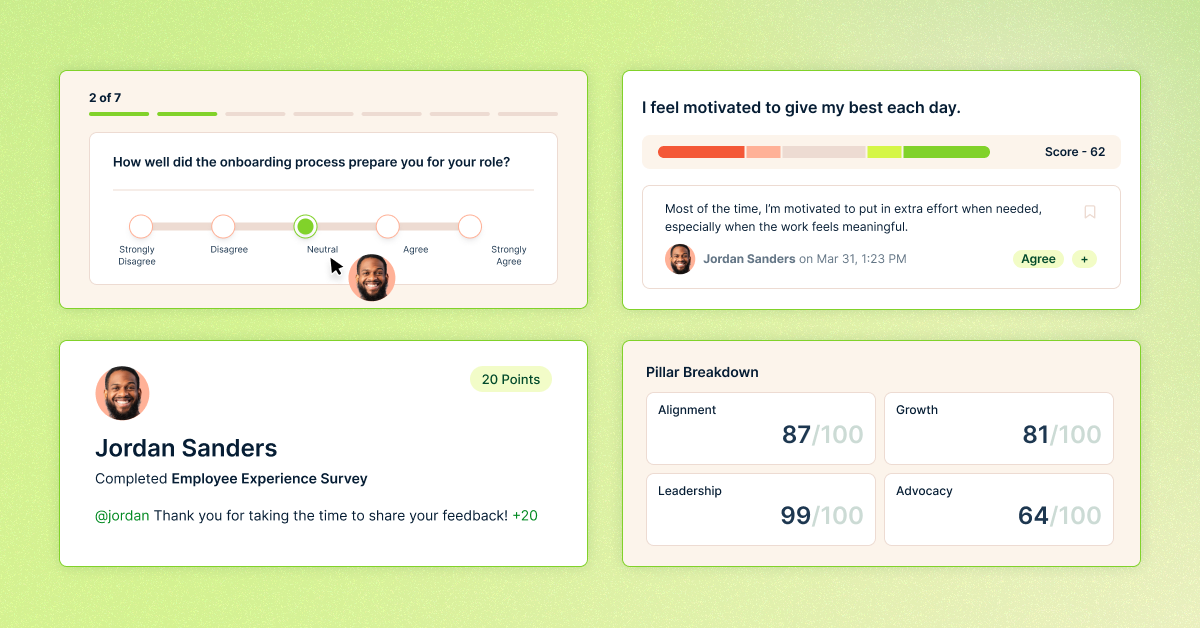What is Company Culture? (Plus 20 Ways to Improve It)
%2520(1).avif)
As a company grows, one of the most important things it can do is invest in company culture.
Whether you like it or not, your organization builds a culture or brand. What you accept as you start your organization gets inherited from employee to employee. It can be challenging to reign in a poor culture without taking active steps to improve it.
If you are struggling with a culture problem, you are not alone. Thankfully, you've taken a step toward understanding culture and teaching your organization strategies to improve it.
What Is Company Culture?
At its core, company culture is a mix of organizational behaviors and attitudes. From the moment you start your organization, you build a corporate culture based on:
- Acceptable employee behavior
- Leadership styles
- What the company seems to value
- How you set employee expectations
- ...and more.
Corporate culture impacts how your organization maintains talent. For example, if you are building a toxic culture, you'll probably find that many of your employees exhibit some of these behaviors from the beginning or learn to adopt them. The same can be said of building a positive culture.

Why Is Company Culture Important?
According to a recent study done by LinkedIn, 40% of job seekers point to company culture as a top priority when picking out a new role. In addition, this same study found that company posts that mention culture receive a 67% engagement bump on the platform.
Another report from OpenView shares the importance of building culture and employee retention. A whopping 42% of the executives they surveyed shared that their company's culture was why they began looking for another role.
Corporate culture has become a sticking point for many candidates. If organizations want to succeed at keeping top talent, they need to look at the employee experience they are creating.

What Qualities Should Leaders Look For In A Company Culture?
If you are new to an organization or assessing its long-term success, you might be wondering what to look for in a company culture. Here are just a few of the qualities leaders should look for:
- Transparency
- Teamwork
- Diversity, equity, and inclusion
- Praise and recognition
- Flexibility and autonomy
20 Ways To Improve Company Culture
Improving company culture isn't as challenging as it seems on the surface. Enhancing your organization can feel like an impossible task, but making minor changes to improve employee experience will make a significant difference. Here are 20 strategies you can use in your business to improve the culture at work.
1. Build A Stellar Employer Brand To Attract The Right Candidates
One of the first things you have to focus on is building an employer brand that attracts top-tier people. Corporate culture is made of the decisions and judgments of your people. So if your brand attracts the wrong people, your culture will reflect that.
Even if you aren't actively working on your brand, you are building a reputation. Check out your company's reviews on Glassdoor, Indeed, and other job sites. What do your employees and candidates say about your brand?
Based on those statements, divide what others say into a few categories. Share what you:
- Are proud of: Statements that you'd want to be known for.
- Wish to change: Statements that are on the fence and can be good or bad, but don't have dire consequences either way.
- Want to get rid of: Statements you don't want to be known for, especially if they could have adverse effects.
Once you go through this exercise, you can begin to share what your brand looks like. What image do you want to shed? What idea do you want to share with potential candidates? Take action to get rid of bad perceptions and lean into good ones.
Use what you learned to inform job descriptions, your career page, and how you talk to potential candidates.

2. Create A Strategic Recruiting Experience To Find Top Talent
Next, it's time to give your recruiting experience a revamp. Recruiting helps you find top talent who can add value to your team. Since these employees will be joining your company, you need to focus on sharing your culture with them throughout the recruiting process.
One of the best things you can do is treat candidates like you would treat your current team members. Value their time, respond to their questions, and connect with them on a deeper level during the interview process. Show that you live by your company's core values before they even join the team.
3. Onboard New Employees Effectively
After you hire an employee, the next stage of their experience is crucial. Employee onboarding is an art form that your company must master.
The first few weeks of a team member's tenure at your organization set the foundation for their experience. Therefore, you want to make sure that these first weeks are organized, helpful, and fun.
Some companies try to rush employees through the onboarding process, but that doesn't help your new team member get used to working at your company. Instead, smart companies create a 90-day plan to get their employees up to speed. Building a quarter-long plan for full productivity can feel intense, but it helps set your team up for success in the long run.

4. Devote Time To Employee Retention
Once an employee gets onboard, you need to keep them there. Strong culture starts with people who stay at your company for longer than a few months. Building something meaningful is hard if your team is a revolving door.
Spend energy on crafting an employee retention strategy and building staff loyalty. You'd be surprised how a little effort goes a long way to improving employee tenure.
5. Write A Culture Playbook Employees Can Reference
Do your team members understand your company's culture? Many companies think about culture as a feeling and pass it down in random stories during team-building events. However, company culture isn't lore, it's essential, and it deserves to be written down. You won't regret having a deeper knowledge of these company culture facts later.
Spend some time writing down your company's culture:
- Words that you use internally that outsiders or new employees may not be aware of.
- Stories that are often told (especially ones about how the company started.)
- Important people and customers who have made a profound impact on your organization.
6. Rework Your Company's Mission, Vision, And Values
Culture can feel subjective, but one way it shows up tangibly is through your organization's mission, vision, and values.
If you haven't revisited these parts of your organization in a while, it's time to give them a look and make sure they still resonate with your company. You might find that you don't wish to change these statements, but it's important to revisit these occasionally to make sure they make sense.
Put some time on your executive team's calendar to go over and update these company statements. Executive team members may not understand the purpose of looking at these documents often. Letting executives know those clear company statements can help attract better talent will help them take it seriously.
7. Offer The Right Employee Benefits And Perks
Companies with a stellar culture offer their employees benefits and company perks that align with their needs. Benefits reflect how you want to show up for your team members. Employees often consider benefits and perks when deciding between two job offers or whether to stay at an organization. Here are options to consider when picking the right benefits:
- Remote work
- Retirement savings
- Health insurance
- Peer recognition
- Paid holidays
- Paid time off
- Tuition reimbursement
- Student loan repayment
- Family planning
- Wellness stipends and programs
8. Measure And Improve Workplace Happiness
Do you know how happy your employees are right now? Would you say they feel excited to go to work every day, or do they dread it? If they dread it, how do you solve that problem? Simple, measure and improve workplace happiness.
Start by sending out quarterly employee engagement surveys. On those surveys, you can ask questions about workplace happiness and ask employees to expand on their thoughts. Then, after you've spent time looking at all the answers, you can formulate an action plan to improve happiness at work.
Happiness at work isn't defined by company pizza parties and ping pong tables. Workplace happiness is about creating a transparent workplace where great ideas thrive, and employees feel comfortable speaking up.

9. Invest In Autonomy Over Micromanagement
"It doesn't make snese to hire smart people and tell them what to do; we hire smart people so they can tell us what to do."
–Steve Jobs
Receiving feedback and input from your manager is helpful, but it can lead to micromanaging if you aren't careful. Getting a ton of feedback from a manager can create a situation where employees feel like they aren't trusted to do their jobs.
In a survey conducted by Trinity Solutions, 69% of the people who had experienced micromanagement considered leaving their jobs. If you want to improve retention and build a stellar culture, managers have to rethink their leadership style.
10. Provide Consistent Recognition For Staff Members
When was the last time you gave your team recognition? If you have to think about this question, you probably aren't sharing enough recognition with your team members.
Employees need to feel like their time is appreciated. It's nice to thank the people who help you excel and grow the business.
One strategy you can use to make recognition more consistent is using a peer recognition tool like Nectar. Public peer recognition makes it easy for everyone to get involved in providing praise while building a record that can be used for promotions and raises down the line. Plus, Nectar uses a points system that you people can cash out for tangible rewards.
Peer recognition takes some of the weight off managers and executives because anyone can celebrate a team member. Recognition software also helps you spot who isn't getting recognized so you can give them some extra love and reengage them at work. It's a win/win for everyone.
11. Share Employee Feedback Early
Getting feedback is essential to growth in an organization. Holding your employees accountable and ensuring they deliver quality work products start with giving feedback. Feedback needs to be timely, or you could wind up setting a project back or rewarding negative behavior.
When working with a team member to set a new work goal, think about appropriate feedback points. For example, if an employee is working on a quarterly plan, set some project milestones and provide feedback. Appropriate feedback creates a positive culture where teams can do their work, ask questions, and get relevant feedback consistently. Leaders must show up for their teams when needed for this structure to work.

12. Survey Your Team Often To Ensure You Meet Expectations
Do you know if you are meeting your team member's expectations? If you aren't conducting quarterly surveys, there is a chance you are missing out on an opportunity to understand where your organization might be lacking.
Quarterly surveys are just the start of meeting your employees' needs. Acting on the data you get from these surveys will ensure that your employees know you mean business. If you use a survey like Gallup's Q12 survey, where do you score the lowest? Spend time working on where you can improve most.
Outside of surveys, communicate with your team members. Getting results from team members who haven't seen surveys lead to action might be challenging. Let your team staff know that you are actively working on improving the workplace. Taking a few minutes of your weekly 1:1 to address workplace issues can go a long way.
13. Cultivate A Inclusive Space For Employees
According to a survey by LinkedIn, 26% of respondents believe that diversity and inclusion is a top area companies can invest in to improve company culture.
Diversity, equity, and inclusion are vital for a team to feel psychologically safe. Diversity isn't about checking off a box to ensure you are interviewing a certain number of diverse candidates. How do you make diverse groups feel once they sign on to your company?

14. Get Rid Of Ineffective Policies
A workplace is only as effective as its policies are. Policies often become ineffective or unhelpful as team circumstances and dynamics change. As you grow your organization, strategies that worked as a small team become obsolete.
Executive team members should meet at least once a year to go over the current policies listed in the handbook. Do these policies still serve your organization? If not, what needs to be tweaked to make the policies work? Can you change a few words, or do you need a new version written?
As you build your new policies, consult with the people who will be affected by them: your employees. New approaches must help your employees feel more confident in the organization.
15. Host Meaningful Company Challenges
Friendly competition can make everyone rise to the occasion. However, when hosting these competitions, you need to make them meaningful. For example, you might choose to do a company wellness challenge or a pitch competition for the next product offering.
You can also create team challenges to bring employees together. Team challenges are great when you want to pair up employees across the organization and build camaraderie. Teamwork is an essential part of building a great culture, and these challenges can be an easy way to bring that idea to life.
16. Set And Share Business Goals With Your Team
Are your company goals clear? Do your team members understand why you've set these goals? Are they aware of how their job impacts the company's goals?
All these elements need to be in place to build a transparent culture. Make sure that everyone on your team is on the same page when determining how you want to grow your business.
Employees should be involved every step of the way as you create quarterly and yearly goals for the team. The easiest way to do this is to set company goals and ask each department to identify what they need to realize that goal. This goal isn't always revenue, but there's a chance that it typically is. Other plans may include:
- Going public.
- Launching a new product line.
- Getting a new round of funding.
- Growing the team.
- Acquiring a new company.
Each of these goals requires a different strategy from team members. Knowing the company goal upfront can help your team understand the work they need to do and how they must show up at work.
17. Give Your Team Room To Fail
When you set a significant company goal, there is always a possibility that you might fail.
When an employee fails to meet their goal, what happens after that? Are they immediately reprimanded for missing a goal? Or does their manager have a conversation to discuss how they can meet their goals in the future? It's vital to hold teams accountable, but scolding an employee isn't always an appropriate action.
If employees feel like they'll be scolded for missing significant goals, they'll stop aiming for them. Innovation is what makes a company great. Make sure you reward bold moves by giving your staff room to make mistakes.

18. Offer Transparency At Work
Transparency is a necessity when building a company. Employees like to be kept in the loop about what's happening. But, you might be wondering, what does this look like in action?
- Being clear on business goals.
- Allowing employees to disclose their salaries as they see fit.
- Utilizing a clear rubric to discuss job levels and promotions.
- Opening up about the financial or cultural issues happening within the company.
- Allowing team members to ask questions and answering them promptly.
19. Add Employees To Your Human Resources Team Quickly
Does your organization have a human resources department? When a team is small, it can be easy to avoid hiring an HR department in favor of letting team executives handle employment disputes. However, as your organization grows, employing at least part-time HR help becomes necessary.
Most experts encourage companies to hire a full-time HR professional at 50-100 employees. A full-time HR professional can help you tackle some of the deeply rooted company culture issues your organization might have developed initially.
20. Admit When Great Culture Turns Bad
As you grow, stuff that felt like great culture when you started can become toxic.
"What got you here won't get you there."
-Marshall Goldsmith
It can feel like you've set your team up for failure when you realize that the culture you've built has gone toxic, but it's not that simple.
As your team grows, employees come and go, dynamics shift, and it's easy for culture to turn bad. When organization leaders refuse to see or fix negative situations, there is cause for alarm. The best thing that organizational leaders can do is own up to these bad cultures and resolve issues.
As you hit company milestones, ask yourself, "Does the way we do things now serve our next stage?" If you can't answer affirmatively, it's time to assess what you can do to fix your company's culture.

Conclusion: Company Culture Is Ever-Evolving
If you can take one thing from this article, let it be that company culture is ever-evolving. The experiences that made your company great may not always serve your best interests. Company leaders that take culture seriously, pivot when things go awry, and try to build a stellar work environment will be rewarded. Your organization may not always get it right, but owning up to your errors and fixing issues will make your team excited to work every day.














